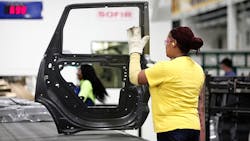Fiat Chrysler, GM Soar as Trump May Weaken Fuel-Economy Rule
Fiat Chrysler Automobiles NV gained the most in two years and General Motors Co. the most in a year after President-elect Donald Trump selected a prominent critic of global warming to lead his Environmental Protection Agency transition team. Tesla Motors Inc., which is betting big on alternative energy, declined.
The EPA is scheduled next year to evaluate President Barack Obama’s ambitious fuel-economy regulations that were originally intended to double the efficiency of the nation’s light-vehicle fleet to 54.5 miles per gallon of gasoline by 2025. Myron Ebell, a director at the Washington-based Competitive Enterprise Institute and climate-change skeptic, is leading the agency’s transition to the Trump administration.
“We believe it is unlikely that new fuel-economy rules will be passed or that existing ones will be strengthened,” Adam Jonas, an analyst at Goldman Sachs, said in a report to clients. “Enforcement and preservation of current CAFE standards is unclear.” That could be positive for automakers looking to sell more profitable pickups and sport utility vehicles and negative for makers of hybrids or pure-electric vehicles.
Fiat Chrysler, which sells the highest proportion of light trucks among the biggest automakers, surged 9.7%, the most since Oct. 29, 2014, to close at $7.59. GM climbed 5.7%, the most since Oct. 21, 2015, to $32.73. Ford finished at $11.94, a 3.1% gain, the biggest since April 28.
‘Demote’ the EPA
Trump will “follow the national Republican Party platform on the EPA, which will actually demote it as an agency and have it report to a joint bipartisan committee and essentially take away much of its independence,” said Sean McAlinden, an automotive economist in Ann Arbor, Michigan. “The CAFE rules would be canceled,” he added, referring to the corporate average fuel economy standards.
Even if Trump doesn’t scrap it entirely, his administration may “lessen the stringency” of the four-decade old program, said Jack Nerad, an analyst with Kelley Blue Book.
“I would think auto companies would prefer that,” he said. “They would look at that as somebody who would not put another roadblock between them and the consumer.”
Weaker fuel-economy rules may accelerate the shift from cars to pickups, SUVs and vans as well as reduce demand for hybrids or pure-electric vehicles.
American depositary receipts of Toyota Motor Corp., the maker of the Prius hybrid line and top seller of cars in the U.S., fell 0.8% to close at $110.86, and those of Nissan Motor Co., which invested heavily in its Leaf electric car and sells the fewest trucks among the top six automakers, dropped 4.9% to $18.65. Tesla, the Palo Alto, California-based company that produces only electric vehicles and is buying solar-panel installer SolarCity Corp., declined 2.5% for a second straight day to close at $185.35.
Rules Request
Also Thursday, the Alliance of Automobile Manufacturers sent an eight-page letter to the Trump transition team with a series of recommendations, including aligning programs run by the EPA and the National Highway Traffic Safety Administration. Inconsistent rules threaten to saddle the industry with “potentially billions of dollars in fines,” said the trade group, which represents most of the world’s biggest automakers including GM, Ford, Toyota and Volkswagen AG.
The alliance asked for a presidential panel to review all auto regulations, including fuel-economy rules, as consumers continue to reject efficient cars and electrified vehicles in favor of pickups and SUVs.
“The combination of low gas prices and the existing fuel efficiency gains from the early years of the program is undercutting consumer willingness to buy the vehicles with more expensive alternative powertrains,” the group said.
About the Author
Bloomberg
Licensed content from Bloomberg, copyright 2016.
